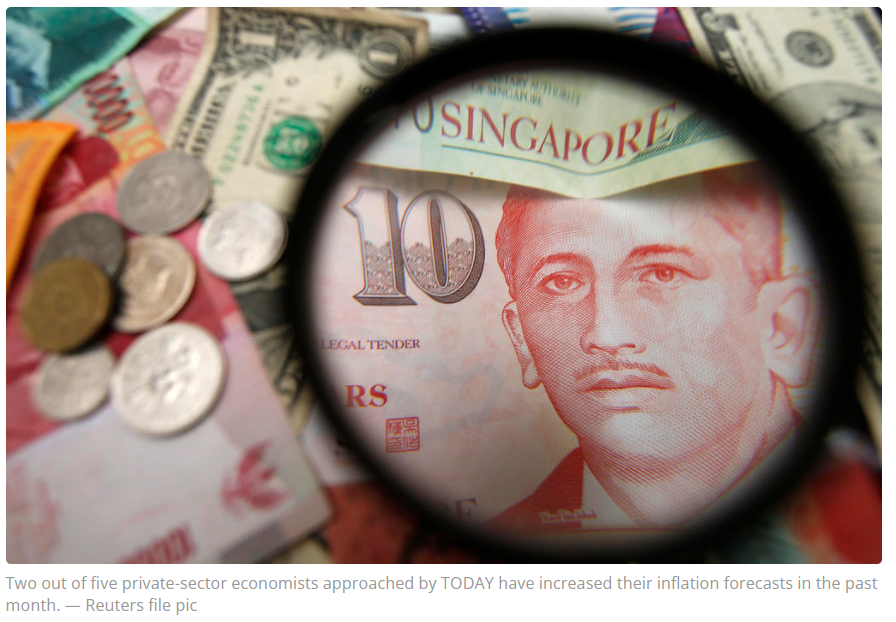Some economists increase Singapore inflation forecasts as Russia-Ukraine conflict escalates
SINGAPORE, March 10 — Some economists in Singapore are raising their 2022 inflation forecasts as the Russian invasion of Ukraine adds further pressure to already hard-pressed global supply chains and energy prices.
Two out of five private-sector economists approached by TODAY have increased their forecasts in the past month.
This is in line with findings of the Monetary Authority of Singapore’s (MAS) quarterly survey on professional forecasters released on Wednesday (March 9), which showed economists raising their predictions for both Singapore’s core and headline inflation for the whole year.
According to the survey, the median core inflation forecast for 2022, which strips out accommodation and transport costs, has risen to 2.7 per cent. This is a hefty increase from the 1.8 per cent median forecast in the previous survey in December.
Meanwhile, the headline or overall inflation estimates came in at 3.6 per cent, up sharply from 2.1 per cent in the December survey. A total of 23 economists responded in the latest MAS survey, all doing so after hostilities broke out in Ukraine on Feb 24.
The other three economists whom TODAY spoke to adopted a wait-and-see approach, citing the uncertainties surrounding the conflict in eastern Europe since Russia launched its attack on Ukraine.
Why economists are upgrading 2022 inflation forecasts
OCBC Bank upgraded its overall inflation forecast for 2022 to 4.2 per cent from 3.5 per cent. The bank revised its core inflation forecast for the year to 3.5 per cent, up from 2.7 per cent previously.
Selena Ling, its head of treasury research and strategy, told TODAY that the latest forecast is based on the “likelihood of a prolonged Russian-Ukraine conflict sustaining energy and even food inflation higher for longer”.
She also cited the assumption that oil prices “will average around US$120 (RM502) for the rest of this year”.
Russia is a major oil and gas producer so the conflict has sparked supply fears, driving energy prices higher.
Other upside risk factors Ling drew attention to include the ongoing food inflation and tightening of the domestic labour market in Singapore.
Standard Chartered Bank pegged its forecasts for headline and core inflation at 3 per cent and 2.3 per cent respectively for 2022.
Again, these forecasts are markedly higher than the bank’s earlier average prediction of 1.9 per cent headline inflation and 1.8 per cent core inflation for 2022, as reported by business magazine Singapore Business Review last month.
Identifying oil prices as the biggest upside risk to inflation, Jonathan Koh, the bank’s economist for Asia, told TODAY: “How energy prices move from here will depend quite significantly on the geopolitical situation.
“However, it may be likely that energy prices remain elevated for some time. Any easing in inflation may only be in the second half of the year.”
Other economists, while agreeing that the escalated conflict posed upside risks for inflation, have held off revising their forecasts for now.
Lee Yu Je, an economist at Maybank, maintained the bank’s headline inflation forecast from end-January for the whole of 2022 at 3.6 per cent and for core inflation at 2.7 per cent.
She said that the bank will continue observing developments of the conflict and the latest local inflation figures for February, before deciding on a revision.
Meanwhile, UOB expects headline inflation to stay above the 3 per cent mark at least for the first half of 2022, while core inflation may remain at 2 per cent or higher for the rest of the year, said its economist Barnabas Gan, reiterating the figures he shared with TODAY late last month.
Economist Song Seng Wun from CIMB bank, while acknowledging upside risks to his inflation forecasts in late February, did not give a revised number as “we don’t know how protracted the war itself is”.
“Even if it’s resolved, we might find that sanctions on Russia and companies withdrawing businesses with Russia may still persist for a longer period,” he said.
This may cause prices to stay elevated even longer owing to the importance of the two countries in many key commodity markets, he added.
Song in late February had predicted headline inflation to ease to about 2 per cent by this December. He expected core inflation to hover around 2.5 per cent or higher in the first half of the year, before dropping to about 1.5 per cent or lower by December.
Singapore’s economic growth forecast
Song added that with Singapore being a trade-oriented economy, the rising costs of imports will have a large bearing on its growth.
“So how long and how fast (costs) rises and how sustained and protracted it stays high, are important variables to consider whether we get stagflation — which is high inflation, no growth; or recession — high inflation, triggering a pullback in consumption and the recession follows,” he said.
Lee from Maybank said the direct impact of the Russian-Ukraine conflict on Singapore’s economy may be “quite small” due to the relatively small trading relations between Singapore and Russia.
However, she added, a recession in Europe — which is very dependent on Russia for their energy imports – would have a spillover effect on Singapore.
“(This is) because Europe still accounts for quite a large share of total exports for Singapore — around 8 per cent,” she explained.
High prices may also dampen Singapore’s growth as they weigh down buyers’ sentiments and their spending, according to Lee, Song and Koh.
Song said that this would particularly be the case if inflation outpaces wage growth in Singapore, which would lead to a negative real wage growth.
He said: “And then we’d say ‘Wah, I must cut back makan or spending.’ That will then hurt economic growth and (pose) downside risk to GDP (gross domestic product) growth.”
Meanwhile, MAS’ survey indicated that economists expect Singapore’s GDP, that is, the nation’s overall economic output, to expand by 4 per cent in 2022, unchanged from the previous survey. — TODAY
Source: https://www.malaymail.com/news/singapore/2022/03/10/some-economists-increase-singapore-inflation-forecasts-as-russia-ukraine-co/2046560


 English
English




